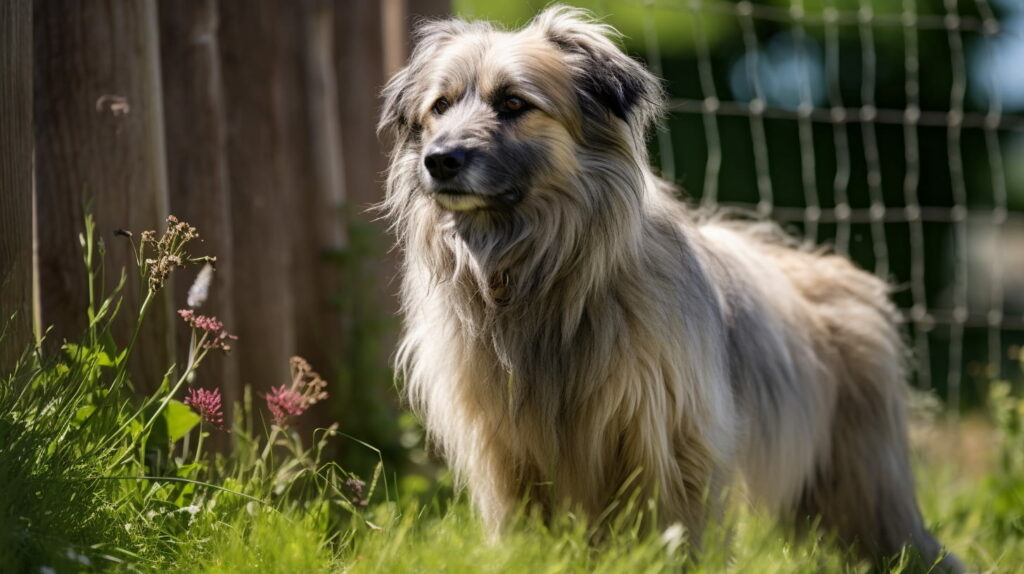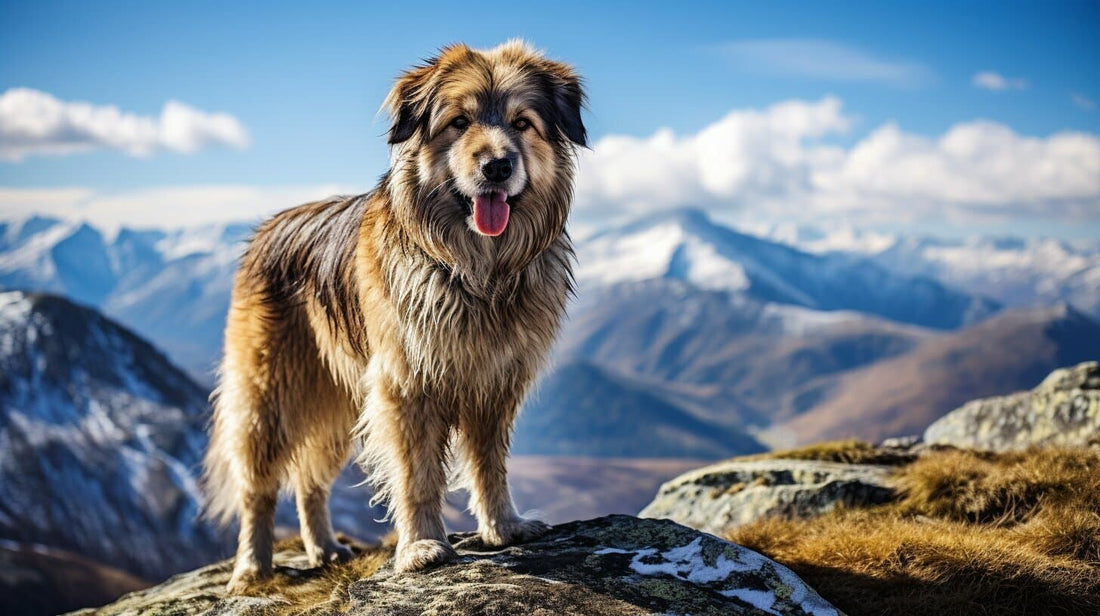Are you ready to meet a new furry friend? Look no further than the Pyrenean Shepherd, a friendly mountain dog breed found in America. These intelligent and energetic dogs make excellent companions for active individuals and families. In this guide, we'll provide an in-depth look at this versatile breed, from their history and temperament to their exercise needs and health concerns.
Key Takeaways:
- The Pyrenean Shepherd is a friendly mountain dog breed found in America.
- They are intelligent and high-energy, making them great companions for active individuals and families.
- Throughout this guide, you'll learn about their history, temperament, physical characteristics, training and socialization needs, and more.
Getting to Know the Pyrenean Shepherd
The Pyrenean Shepherd, also known as the French sheepdog, Berger des Pyrénées, Pyr Shep, or Pyrénéan sheepdog, is a breed of dog that originated in the Pyrenees Mountains of France. This versatile breed was bred as a herding dog, but their intelligence and high energy make them suitable for a variety of roles.
The Pyrenean Shepherd is a member of the shepherd family of dogs and has been used for centuries in the Basque country as a sheepdog. They are known for their agility and are often used in dog sports like agility and obedience. The breed is also highly adaptable and makes a great family pet.
Temperament and Personality
The Pyrenean Shepherd is a highly versatile breed, excelling in a variety of roles from herding livestock to serving as a loyal family companion. Their intelligence, adaptability, and high-energy nature make them a popular choice for active owners.
Pyrenean Shepherds are known for their strong work ethic and desire to please their owners. They thrive on mental stimulation and physical activity, requiring plenty of exercise to maintain their health and happiness. These dogs are quick learners and respond well to positive reinforcement training techniques.
Despite their high energy levels, Pyrenean Shepherds also have a gentle and affectionate nature. They love spending time with their owners, often seeking out attention and affection. This breed is generally good around children and can make an excellent family pet when properly socialized.
Owners should be prepared to provide their Pyrenean Shepherd with plenty of exercise, mental stimulation, and positive reinforcement training. Without proper care and attention, this breed can become bored and destructive.
Physical Characteristics
The Pyrenean Shepherd is a small to medium-sized dog breed with a distinctive shaggy coat. They typically weigh between 15 and 32 pounds and stand 15 to 21 inches tall at the shoulder. Their coats come in two types: rough-faced and smooth-faced, and they come in a variety of colors ranging from fawn to black.
Their bodies are well-proportioned, with a slightly longer body than their height at the withers. They have a wedge-shaped head, with almond-shaped eyes that are usually brown, and erect, pointed ears. Their tails are usually docked to a medium length, but some breeders prefer to leave them natural.
The Pyrenean Shepherd's double coat is designed to keep them warm in cold weather, and they shed heavily twice a year. The rough-faced variety has a longer and coarser topcoat, while the smooth-faced variety has a shorter and denser coat. Both require regular grooming to keep their coats healthy and free of matting.
Grooming and Coat Care
To maintain a healthy and clean coat, Pyrenean Shepherds require regular dog grooming. The rough-faced variety needs to be brushed weekly to prevent matting, while the smooth-faced variety needs less attention. They should be bathed every few months, or as needed, and their nails should be trimmed regularly to prevent overgrowth.
It's important to check the Pyrenean Shepherd's ears regularly for signs of infection, such as redness, swelling, or a foul odor. Their teeth should also be brushed regularly to prevent dental issues, and their eyes should be wiped clean to prevent tear staining.
Overall, the Pyrenean Shepherd's shaggy coat requires moderate maintenance to keep it healthy and clean, but their affectionate personality and energetic nature make them a charming addition to any household.
Training and Socialization
The Pyrenean Shepherd is an intelligent and versatile breed that excels in various activities, including herding, agility, and obedience. However, their high-energy nature and strong working instincts can make them challenging pets for inexperienced owners.
Training
Training the Pyrenean Shepherd requires patience, consistency, and positive reinforcement. Start with basic obedience commands like "sit," "stay," and "come," and gradually progress to more advanced skills like agility and herding. Keep your training sessions short and fun, and use plenty of rewards and praise to motivate your dog.
It's also essential to socialize your Pyrenean Shepherd from an early age. Expose them to different people, animals, and environments, and teach them how to behave appropriately in different situations. This will help prevent behavioral issues like fearfulness, aggression, and territoriality.
Socialization
Pyrenean Shepherds are highly social animals that thrive on human companionship. They enjoy spending time with their families and are known to be great with children. However, they may be wary of strangers and unfamiliar animals, so it's important to socialize them well to prevent fearfulness or aggression.
To socialize your Pyrenean Shepherd, take them to different places and expose them to different people and animals. Encourage positive interactions with other dogs and people, and reward your dog for calm and friendly behavior. You can also enroll your Pyrenean Shepherd in puppy classes or obedience training courses to help them learn social skills in a supervised environment.
Remember, socialization is a lifelong process, and you should continue exposing your Pyrenean Shepherd to new experiences throughout their life.
Exercise Needs
The Pyrenean Shepherd is a high-energy dog breed that requires plenty of exercise to stay healthy and happy. They are best suited for an active lifestyle with plenty of outdoor time. A daily walk or run is not enough for this breed, and they will benefit from additional activities to keep them mentally and physically challenged.
One great way to provide exercise for your Pyrenean Shepherd is by participating in dog sports, such as agility or flyball. These activities also allow for mental stimulation and can strengthen the bond between you and your furry companion.
If you do not have access to dog sports, consider taking your Pyrenean Shepherd on hikes, playing fetch or frisbee in a large, fenced area, or even allowing them to swim if they enjoy it. Keep in mind that this breed can become destructive if they do not receive enough physical and mental stimulation, so it is essential to provide them with plenty of exercise opportunities.
Health and Potential Issues
Pyrenean Shepherds are generally healthy and hardy dogs with a life expectancy of 12 to 15 years. However, like all breeds, they are susceptible to certain health issues that potential owners should be aware of.
One common health problem in Pyrenean Shepherds is hip dysplasia, a condition that affects the hip joint and can cause discomfort and mobility issues. Other potential issues include patellar luxation, eye problems, and allergies.
To keep your Pyrenean Shepherd healthy, it's important to schedule regular check-ups with a veterinarian and provide appropriate preventive care. This includes vaccinations, parasite prevention, and dental care.
Preventive Care Tips:
| Health Concern | Preventive Care Tips |
|---|---|
| Hip dysplasia | Choose a reputable breeder who screens for this condition, maintain a healthy weight, and provide regular exercise to keep joints strong and flexible. |
| Patellar luxation | Regular exercise and maintaining a healthy weight can help prevent this condition from developing or worsening. Surgery may be necessary in more severe cases. |
| Eye problems | Regular eye exams can help detect and address issues early on. Keep eyes clean and free of debris and avoid exposing your dog to irritants like cigarette smoke or chemicals. |
| Allergies | Identify and avoid triggers that cause allergic reactions in your dog. Your veterinarian may recommend medication or allergy shots for more severe cases. |
By providing proper care and attention, you can help ensure that your Pyrenean Shepherd remains healthy and happy for years to come.
Grooming and Coat Care
The Pyrenean Shepherd has a unique double coat that requires regular grooming to maintain its health and appearance. Their thick undercoat keeps them warm in colder weather, while the long, silky topcoat protects from moisture and sun damage.
To keep your Pyrenean Shepherd's coat looking its best, brush them at least once a week using a slicker brush and metal comb. Pay special attention to their feathering, which may mat easily and require more frequent brushing.
Bathing should be limited to every three to four months, as frequent bathing can strip their coat of natural oils. Use a gentle dog shampoo and conditioner to keep their coat shiny and healthy.
Regular trimming of their nails and cleaning their ears are also important parts of a Pyrenean Shepherd's grooming routine. It's best to start grooming your Pyrenean Shepherd as a puppy to get them used to the process and make it an enjoyable experience.
Feeding and Nutrition
As a high-energy breed, the Pyrenean Shepherd requires a well-balanced diet to maintain their health and vitality. A diet high in protein is essential for their muscle development and maintenance.
When choosing food for your Pyrenean Shepherd, opt for high-quality, protein-rich dog food that meets their nutritional requirements. Avoid generic or low-quality dog food, which may contain fillers and additives that could harm your dog's health.
The amount of food your Pyrenean Shepherd requires will depend on their age, size, and activity level. As puppies, they need more frequent meals to support their growth and development. As adult dogs, they should be fed twice a day.
Be mindful not to overfeed your Pyrenean Shepherd, as they have a tendency to gain weight. Obesity can lead to various health problems, including joint and heart issues.
It is also important to provide your Pyrenean Shepherd with fresh water at all times. Dehydration can cause serious health problems, so ensure they have access to water both indoors and outdoors.
Living with a Pyrenean Shepherd
The Pyrenean Shepherd is a highly adaptable and versatile breed, which makes them an excellent addition to many types of households. Their friendly and energetic nature makes them a great family dog, and they are known to be particularly fond of children. They are a highly social breed that thrives on human interaction, so they would be happiest in a household where there is always someone around to engage with them.
As with any breed, early socialization is crucial to ensure that Pyrenean Shepherds develop good manners and are comfortable around new people and other animals. They are intelligent dogs that are eager to please, which means that training should be both rewarding and fun for both you and your dog. These dogs have a lot of energy and require plenty of exercise to keep them physically and mentally stimulated. If you lead an active lifestyle, a Pyrenean Shepherd may be the perfect companion for you.
Interactions with Children and Other Pets
Pyrenean Shepherds are generally excellent with children and other pets in the household. However, as with any breed, it is still important to supervise interactions and ensure that they are safe and appropriate. They have a high prey drive, so they may not be the best match for households with smaller animals such as cats or hamsters.
It's important to teach children how to interact with a dog correctly to prevent any unwanted behavior or harm to the dog. Children should be taught to approach dogs calmly and to give them space when they are eating or sleeping. They should also be taught to respect a dog's boundaries and to never approach them if they are growling or showing any signs of aggression.
If you have other pets in the household, it's essential to ensure that the Pyrenean Shepherd is introduced to them slowly and carefully. This will help to prevent any aggressive behavior towards the new pet. Always supervise interactions between pets until you are confident that they are comfortable around each other.
Activities and Sports
The Pyrenean Shepherd is a highly versatile breed that excels in various activities and sports. Historically, this breed was primarily used as a herding dog and has maintained that instinct to this day. They have an excellent sense of smell and are highly trainable, making them an excellent candidate for hunting, obedience, and agility.
For those who enjoy outdoor activities, the Pyrenean Shepherd makes an excellent hiking and camping companion. They have high energy levels, so they require ample exercise to keep them happy and healthy. You can take them along on your morning run or an afternoon hike, where they can enjoy the fresh air and put their natural athleticism to good use.
If you're looking for a fun and engaging way to bond with your Pyrenean Shepherd, consider participating in a dog sport like agility. They are quick learners and are eager to please their owners, making them well-suited to this fast-paced activity. Agility courses typically involve running, jumping, and navigating through obstacles, providing a fun challenge for both you and your furry companion.
The Pyrenean Shepherd is also an excellent candidate for flyball, which is a relay race for dogs. In this sport, dogs race through a series of hurdles and retrieve a ball from a spring-loaded box before running back to their handler. It's a competitive and fast-paced sport that requires speed, agility, and precision, which are precisely the qualities that Pyrenean Shepherds possess.
Finding a Pyrenean Shepherd
Looking to bring home a Pyrenean Shepherd? There are a few different routes you can take to find your furry friend.
Adoption
Adopting a Pyrenean Shepherd is a great option if you want to give a loving home to a dog in need. Check with local shelters or rescue organizations that specialize in herding breeds to see if they have any Pyrenean Shepherds available for adoption. You can also check online adoption websites such as Petfinder or Adopt-a-Pet.
Breeders
If you decide to go the breeder route, make sure you do your research and find a reputable breeder with a strong track record. The Pyrenean Shepherd Club of America is a great resource for finding reputable breeders in your area. Make sure to ask the breeder about health testing and the dog's pedigree before making a commitment.
Pyrenean Shepherd Rescue Organizations
There are several Pyrenean Shepherd rescue organizations throughout the country that may have Pyrenean Shepherds available for adoption. These organizations specialize in the breed and will be able to provide valuable information about the dog's personality and needs. Check out organizations such as Great Pyrenees Rescue of Atlanta or Midwest Pyrenees and Herding Dog Rescue.
Whichever route you take, make sure to ask plenty of questions and do your research before bringing a Pyrenean Shepherd into your home. With a little patience and perseverance, you can find the perfect Pyrenean Shepherd for you and your family.

Training Resources for Pyrenean Shepherds
Training a Pyrenean Shepherd requires dedication, patience, and a deep understanding of their unique temperament and characteristics. Fortunately, there are many resources available to help you train your Pyr Shep effectively and efficiently.
Training Books
There are several excellent books on Pyrenean Shepherd training, including:
- Raising and Training a Pyrenean Mountain Dog by Elizabeth Rosemond
- Pyrenean Shepherd: Pyrenean Shepherd Complete Owners Manual by George Hoppendale and Asia Moore
- Training Your Pyrenean Shepherd Dog by Doug Kitchel
These books offer in-depth guidance on everything from puppy training and socialization to obedience training and advanced tricks and techniques.
Online Courses
Online dog training courses can also be a valuable resource for Pyrenean Shepherd owners. Some popular options include:
- Brain Training for Dogs by Adrienne Farricelli
- Puppy Training: 101 by Dunbar Academy
These courses typically offer comprehensive training videos, tutorials, and quizzes to help you master key concepts and techniques.
Trainers
Working with a professional dog trainer who is familiar with the Pyrenean Shepherd breed can be an excellent way to get personalized guidance and support. Look for trainers who have experience working with high-energy, intelligent breeds and who use positive reinforcement techniques.
Some organizations that can connect you with experienced trainers include:
- The Association of Professional Dog Trainers
- The International Association of Canine Professionals
- The Certification Council for Professional Dog Trainers
With the right training resources and support, you can help your Pyrenean Shepherd reach their full potential as a loving and well-behaved companion.
Pyrenean Shepherds in Pop Culture
The Pyrenean Shepherd breed has made its mark in popular culture, appearing in various forms of media over the years. Here are some instances where this friendly mountain dog has held the spotlight:
| Media | Pyrenean Shepherd's Role |
|---|---|
| The Artist (2011) | Uggie the Pyrenean Shepherd played the main character's loyal companion, winning hearts with his charming demeanor and impressive tricks. |
| Dr. Quinn, Medicine Woman (1993-1998) | Wolf, a Pyrenean Shepherd, played Dr. Quinn's loyal and intelligent dog, appearing in various episodes throughout the series. |
| Tess of the d'Urbervilles (2008) | In this BBC adaptation of Thomas Hardy's novel, a Pyrenean Shepherd named Prince appears as one of the livestock dogs. |
Aside from their roles in films and TV shows, Pyrenean Shepherds have also found themselves in the company of famous individuals. For instance, former French president François Mitterrand owned a Pyrenean Shepherd named Baltique, while famous novelist Colette had a Pyr Shep named Souci. Other notable Pyrenean Shepherd enthusiasts include the late actress Elizabeth Taylor and writer Ernest Hemingway.
"A dog has the soul of a philosopher" - Plato.
Overall, the Pyrenean Shepherd may not be the most well-known breed in pop culture, but they have certainly made their mark in the hearts of those who have encountered them.
Conclusion
In conclusion, the Pyrenean Shepherd is a friendly mountain dog breed that has found a home in America. These French sheepdogs, also known as Berger des Pyrénées, Pyr Sheps, and Pyrénéan sheepdogs, are versatile, intelligent, and high-energy dogs that make great family pets.
It is important to provide them with proper training and socialization, as well as ample exercise to keep them physically and mentally stimulated. Grooming and coat care are also essential, and a balanced diet is necessary for their overall health.
As natural herding dogs, Pyrenean Shepherds excel in activities and sports like agility. They can be found through reputable breeders or adoption options, with helpful resources available for training.
Overall, the Pyrenean Shepherd is a unique and wonderful breed that can bring joy and companionship to any home. Consider adding one to your family and experiencing their many qualities firsthand.
FAQ
Q: Are Pyrenean Shepherds good with children?
A: Yes, Pyrenean Shepherds are typically good with children. They are known to be gentle and playful, making them great family pets.
Q: How much exercise do Pyrenean Shepherds need?
A: Pyrenean Shepherds are high-energy dogs and require at least an hour of exercise each day. This can include activities such as long walks, runs, or playtime in a fenced yard.
Q: Do Pyrenean Shepherds shed a lot?
A: Yes, Pyrenean Shepherds have a dense double coat that sheds year-round. Regular brushing can help keep shedding under control.
Q: Are Pyrenean Shepherds good with other pets?
A: Pyrenean Shepherds can get along well with other pets if properly socialized from a young age. However, their herding instincts may make them inclined to chase smaller animals.
Q: Are Pyrenean Shepherds easy to train?
A: Yes, Pyrenean Shepherds are intelligent and eager to please, making them generally easy to train. Consistent positive reinforcement methods work best with this breed.
Q: What health issues are common in Pyrenean Shepherds?
A: Pyrenean Shepherds can be prone to certain health issues, including hip dysplasia, epilepsy, and eye problems. Regular veterinary check-ups and a healthy diet can help mitigate these risks.
Q: How often should I groom my Pyrenean Shepherd?
A: Pyrenean Shepherds should be brushed at least once a week to prevent mats and tangles in their long hair. Additionally, regular nail trims and teeth cleanings are recommended.
Q: What should I feed my Pyrenean Shepherd?
A: It is important to feed your Pyrenean Shepherd a high-quality dog food that is appropriate for their age, size, and activity level. Consult with your veterinarian for specific dietary recommendations.
Q: Are Pyrenean Shepherds good guard dogs?
A: While Pyrenean Shepherds are alert and protective, they are not typically considered good guard dogs. Their friendly nature may make them more inclined to greet strangers rather than act aggressively.
Q: Can Pyrenean Shepherds be left alone for long periods?
A: Pyrenean Shepherds thrive on human companionship and can become anxious or d


